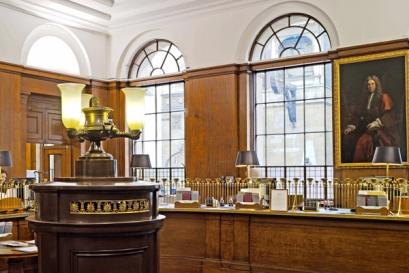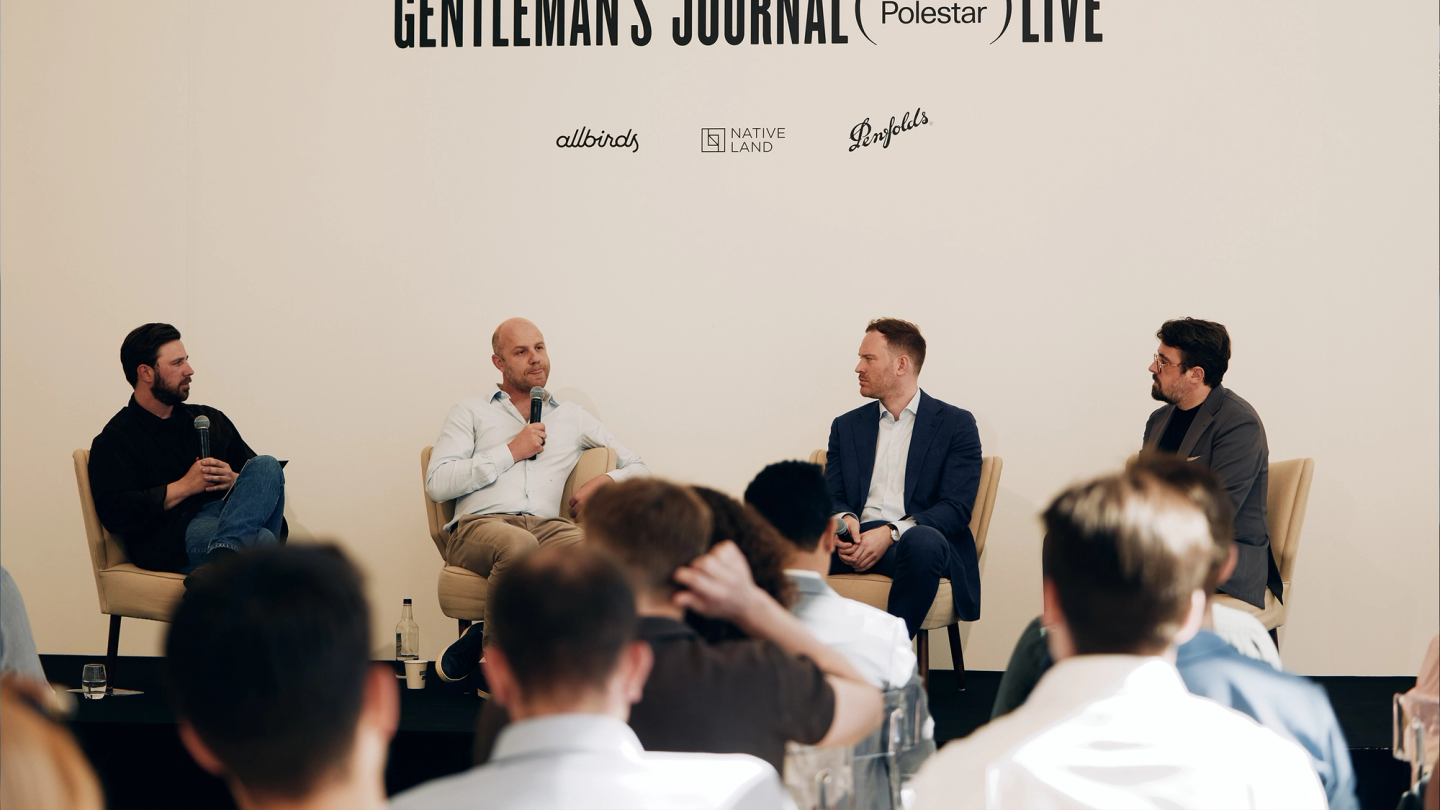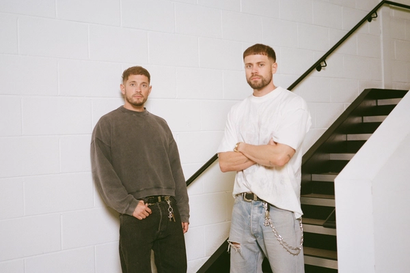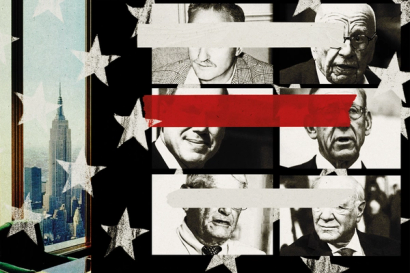

"I heard it at Gentleman's Journal Live..."
Lessons in business, success and life from 14 of our favourite chefs, CEOs, PR gurus, restaurateurs, VCs, watch experts, podcasters, founders, car collectors, wine buyers, publishers and friends
Words: Joseph Bullmore
Photography: Adam Fussell
In the middle of May, Gentleman’s Journal hosted a series of seven panel talks and interviews in the light-filled atrium of Philip’s auction house in Berkeley Square.
This was Gentleman’s Journal Live, and it did, really, what it said on the exquisite ten-feet window decals: took many of the topics that we love to cover in the magazine, and brought them kicking-and-screaming to a live audience. Topics like the highs and lows of the restaurant game; the real world of venture capital; and life as the crisis-manager-in-chief to the most powerful people on the planet.
Our thinking, really, was simple (beyond an apparent pathology for putting on events): that while articles and think-pieces are great for considered storytelling, live conversation often conjures a magic that produces unexpected flashbangs of wisdom and insight. The event was handsomely supported by Polestar, the leading light in electric vehicles, in many ways, whose own interest into the big questions of the day – design, sustainability, aesthetics, start up culture – was brilliantly encapsulated in a brace of cars parked at the entrance for the talks.
Jesse Burgess, co-founder of TopJaw
“When it comes to atmosphere, if the owner is there and has a real hand in things – working the room or behind the bar or working in the kitchen – if they’re there, and they really care, it will just infect that place.
“The reason The Devonshire is different because Oisín Rogers is there all the time. His family live in the New Forest and he’s got a flat on Dean Street, so that he can have a nap from 3pm to 4pm because that’s when everything’s quiet, and then go back to the pub and keep working. That old-school pub landlord figure, in any kind of restaurant, makes places really special, whether you know it or not.”
Tom Gearing, co-founder and CEO of Cult Wines
“The way I think about it is optionality. That’s the most important thing to maintain when collecting wine. What that really means is that, at some point in the future, if you decide to enjoy that wine, you want to make sure it’s been preserved in the best condition possible. But by having that as your MO, you’re also going to be protecting the value. Why do you have to make a decision at any point whether it’s for drinking, for collecting, or for resale? So my advice is always about maximising optionality.”
Harry Stebbings, founder of 20VC, a $400m investment fund, and the 20VC podcast
“There is so much money now, and there are very few generationally defining entrepreneurs. For every one founder we want to invest in today, there are literally 20 term sheets. Which means that everything has got more competitive. Nowadays, we are taking more risks than ever. Revenues mean very little in an AI world. Product-market fit is so transient. Hell, we’re all just fucking gamblers at this stage. You have to take risks to win – but the outcomes are so big. We’re talking trillion-dollar companies here. You’ve got to play the game on the field.
But the biggest worry to me is that we are fading into complete irrelevance in this country. China and the US are kicking our ass when it comes to AI. They are working harder and moving faster, and they are so much more advanced. We are kind of not realising just how fucked we are. We have to inspire the next generation. Otherwise Europe is in deep shit…”
Sandia Chang, co-founder of Bubbledogs and Kitchen Table
“Tesco has customers. We have guests. Everyone has really great energy when they go to a restaurant. Our job is to bring it out of them. If I wasn’t in hospitality, I would probably be a crime scene investigator. I feel like it’s the same job. When a guest comes into our dining room, my job is to figure them out. Why are they here? Where did they come from? Do they need to leave at a certain time because they have a babysitter?
The thing about being a CSI is that you never jump to conclusions, to never assume. It is to find out little bits of information about you, and then connect the dots – and with that create the energy.”
Luca Faloni, founder of Luca Faloni
“If you listen to people in Silicon Valley, they’ll tell you: ‘Only start something if you can make it 10 times better than the next player in the market.’ But my rule is that all you need to do is make your product 10 per cent better than the next player. That’s more realistic. Start from there, and it will lead to better products.”
Chris Youé, Global Sales Director for Phillips Perpetual
“Patek-Philippe is never going to go away, because they’ve built the brand on the most important thing in watchmaking, which is quality. You can look at a Patek from the 1940s, or even a pocket watch from the 1800s, or a Grand Complication in the salon two minutes up the road and the quality will always, always be there. In the long term, the old names – and the ones that none of will be surprised to hear – are still the ones to go for.”
Santiago Lastra, chef-owner of Kol and Fonda
“The most important thing to bear in mind is that hospitality is a marathon, not a sprint. It sounds like it’s a quick and simple industry. But you have to really invest the time and understand that it’s a long game – and you have to love it regardless of failure or success. For it to work, you have to be there, and if you are there and you don’t enjoy it, and it’s not the most incredible thing that fills your whole spirit and life, then it’s probably not the right thing for you. So my advice is: find and pick the thing that you really love – and then do it for a really long time.”
Joe Twyman, classic car expert at Broad Arrow Auctions and Private Sales
“There are a lot of new manufacturers that are coming into the market which, for a younger generation, will probably be their poster cars. Like Singer, who started by taking Porsches and completely reinventing them.
Or people like Gordon Murray, a designer who worked in Formula One for years and ran Brabham, winning championships with Nelson Piquet and Nikki Lauda. He designed the Mclaren F1, and has now started Gordon Murray Automotive, which came out with the T-50. I think that is a car for the future – and I know that, immediately, on the secondary market, if you were to sell one you would double your money.
Dinika Mahtani, partner at leading European VC firm Cherry Ventures
“The people you invest in are everything. With technology changing so quickly, the people are 70-80 per cent of what I make a decision on.
We like entrepreneurs and founders with a huge bias to action. We like founders that aren’t afraid of thinking big and conveying ideas that are immensely big. And we like founders who also understand that the journey is lonely, and that it’s going to be extremely hard – and that they also need to be extremely resilient as they go into it. It’s the combination of all of those things that is what gets me jumping out of bed.”
Jon Connell, founder of The Week and The Knowledge
“I didn’t want The Week to be overly depressing, and this was quite deliberate. One of the problems with newspapers and with television news is that they can be incredibly depressing. I think that one of the lessons I have learned is that one cannot always be looking on the dark side.
The most important thing for a magazine is that it has a heart. Readers have got to know that the magazine is a friend that they know and can trust – that it’s not going to lead them astray or sell them very stupid ideas, while obviously trying to broaden everyone’s mind, of course. It has to have a heart.”
Nick English,cCo-founder of Bremont; co-owner of Yard-O-Led; executive chairman of Moke International
“[My brother] Giles and I have this thing called the ‘three times rule’. Our first accountant said: ‘Everything is going to take three times longer, be three times harder and be three times more expensive than you’ll ever believe.’ He was so right.
My other piece of advice is that the things we do in luxury – watches, for example – are rarely unique. Everyone will tell you it’s a crowded market; you haven’t got a chance against Rolex and Breitling and IWC. But if you focus on the product and get that right, and people have a sense of belonging to what you’re doing, you have a good chance of making it work."
Matthew Freud, PR maestro and chairman and founder of Freuds Group
“My advice to any younger per son would definitely not be to get into PR – but I’ve been saying that almost since I started. My advice would be to travel.
“We are in a pretty dark period. In 40 years, in 2066, we will have had 1,000 years of this singular island nation, from William the Conqueror to either William or George Windsor. You can look at the rise and fall of the British Empire, and our move into a redactive modern history – a time when we have become smaller and smaller. It would be hard to be optimistic about a country that clearly needs to reinvent itself, redefine itself, rebuild itself. We no longer have much domestic industry, and a combination of AI and tech disruption is going to be really challenging. It’s going to be a slog here for the foreseeable future – but there are countries in the world that are very much in the ascendancy.
“And so my advice would be that now would be a good time to travel."
Michael Lohscheller, CEO of Polestar
“Three years ago everybody was talking about climate change. But today it’s different. Five hundred per cent of the questions I’m hearing now are about tariffs.
It’s nonsense. Sustainability is more important and it will be much more important in the future. Climate change is real, it’s happening, and I’m super-proud that we are trying to contribute to fighting this. The future of mobility has to be emission-free.
Times are not certain. Sometimes it’s hard to know what to do. It’s important in terms of leadership to give clarity. But also important to continue to do the right thing, even if you can’t see everything in the foggy weather.”
Harry Destecroix, scientist founder who runs Science Creates, a deep-tech VC
“The biggest change I’ve seen in the start-up and investment world in recent years is how a huge number of advanced technologies have come to fruition – everything from genetic sequencing to CRISPR.
And now, all of a sudden, AI has been sprinkled across everything, and everything is going even faster than before. Much more complicated products and businesses can be built now with a lot less capital, and the pendulum is now swinging towards hard tech and away from mobile. This all means that we’re now getting into some really, really interesting things…”
This article originally appeared in the summer 2025 issue of Gentleman's Journal. Read about it here...


